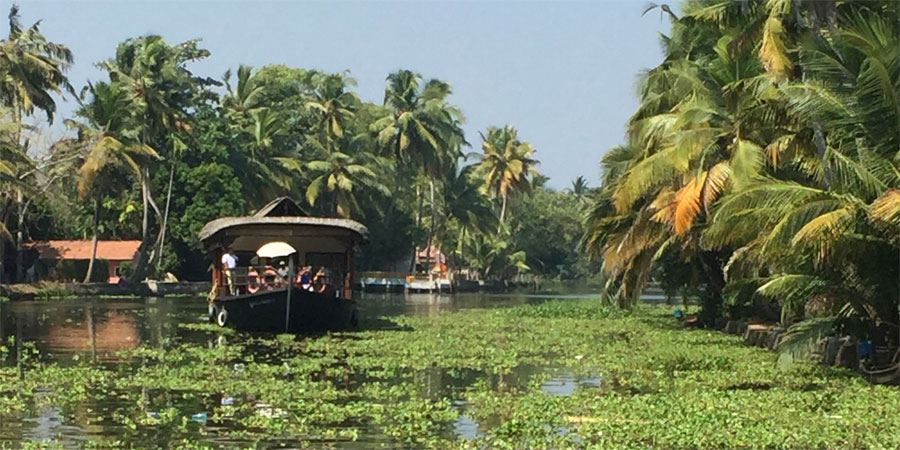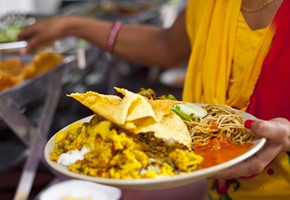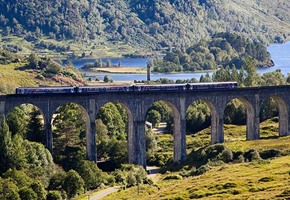This week we enjoy a guest blog written by Great Rail Journeys' CEO, Peter Liney who recently travelled through India by train.
A firm handshake and a broad smile; his name was David (a member of Kerala's Christian community who make up 20% of the population here), and with this and this alone, he welcomed me aboard his giant Chinese fishing net. Here a team of six lowered the netting over 250 times a day into the estuary below, which just a few short metres away transformed into the Arabian Sea. Small hand nets lay scattered around as the fishermen fought a centuries-old battle with local sea birds as to who would win the spoils of the day.
I was in Kochi's Old Town, and the long rows of these time-honoured devices dominated the skyline, but there is plenty of colonial architecture still to be seen, what with Kochi's history of Portuguese, Dutch and British settlers. Many of the small streets here are home to some of the most famous synagogues in Kerala - a small Jewish community first arrived here in the 1st century AD, and for hundreds of years afterwards dominated the lucrative spice trade later taken over by Europeans utilising sea trading routes. Spice was such a money-maker that city defences were built and questionable deals were made with the kings of nearby nations, all of which helped pave the road to the rule of the British Raj, and later the independence won during the uprising of 1946.
The best way to take in the older parts of this city is on foot, the area is not large but it's been wonderfully well-maintained - the shops are many and varied, and in this conclave of southern India you are mainly left to your own devices as you explore, with only the occasional, good-natured request to 'look see' at the goods on offer. Your feet may end up leading you to the Church of St Francis, which plays host to the grave of Portuguese mariner Marco de Vasco who first ventured to this part of the world in 1498, as well as evidence of the more delicate sensibilities of other travelling Europeans. Fans now line the walls of the church for use by the congregation in hot weather where once punkah wallahs would have worked hard to make sure that nobody got overheated during even the longest of sermons. As you leave this peaceful sanctuary, the smell on the air reminds you that Kochi hasn't journeyed too far from its roots as a destination in which to stock up on your cooking supplies; shops and warehouses surround this, the oldest church of its kind on the whole subcontinent, and as dusk falls the streets fill with intriguing figures sorting peppercorns in front of the worldwide peppercorn exchange.
As well as the Old Town and fort area with its fish market (obviously), colonial houses and traditional fishing techniques, another big draw is a visit to the back waters, which lie just a little way out of the city. Here you can gently cruise along the lakes and canals before spending the night at 'back waters hotel', giving plenty of time to relax and watch the world float by as locals go about their daily lives on the banks either side of the specially constructed house boats. After some hectic adventures in this colourfully chaotic country, this environment provides a welcome respite in a unique setting. All this unwinding gives me a chance to reflect on the starting point of my travels, which began in Coimbatore where I joined the Nilligri toy train to Ooty. The train journey itself comes in two parts; the first, longer section undertaken by the power of steam up to Conoor, past elevated tea plantations that thrive in the cooler temperatures as we make stops at stations with names such as Runnymeade, Alderly and Hillgrove. Once we chug into Connoor, the engine is swapped to one of diesel for the final climb up to Ooty.
This hill station may be smaller than its better-known counterpart, Shimla, but it still has many delights to be discovered, which I do on a visit to the lovely botanical gardens and St Stephen's Church where the gravestones of colonial soldiers and their families can clearly be seen. But for now, it's time to rest, the joys of meeting David, uncovering Kochi and floating through the luscious Keralan back waters all still to come.





